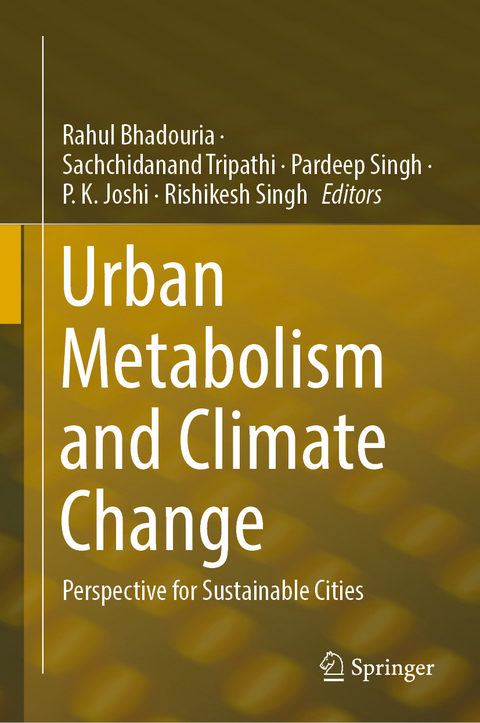
Urban Metabolism and Climate Change
Springer International Publishing (Verlag)
978-3-031-29421-1 (ISBN)
This book provides a basic understanding and state-of-the-art of urban metabolism. Urban centres are increasingly challenged by population increase and the resultant environmental concerns including the urban sprawl and climate change. Different patterns of urbanization contribute to the changing climate via. differences in their urban metabolism represented by energy and matter. Urban metabolic studies in terms of energy and material inflows, outflows, and stocks can be associated with traditional evaluation techniques to help assess the magnitude and potential effects of variety of environmental challenges the world is facing today. Urban centres are critical real time observatories that indicate the impact anthropogenic activities have on global biogeochemical cycles. Urban processes have significant and lasting impacts on the global carbon budget. The technological and infrastructural advancements have fuelled an increase in urban inputs and outputs of material and energy. Therefore, more sustainable approaches need to be adopted in changing scenarios for urban planning, particularly for sustainable resource utilization and better waste management practices. The book emphasises on the sustainability in urban metabolism, sustainable urban planning, ecosystem services, and disaster resilience to provide an interdisciplinary understanding of urban metabolism. The book also identifies an urgent need to develop new methodological approaches for real time and reliable evaluation of urban metabolism.
lt;p>Rahul Bhadouria is working as an assistant professor at the Department of Environmental Studies, Delhi College of Arts and Commerce, University of Delhi, New Delhi, India. He obtained his doctoral degree from the Department of Botany, Banaras Hindu University, Varanasi, India. He has published more than 22 papers, 22 book chapters, and 8 edited books in internationally reputed journals/publishers. His current research areas are, management of soil C dynamics to mitigate climate change, a perspective on tree seedling survival and growth attributes in tropical dry forests under the realm of climate change, plant community assembly, functional diversity and soil attributes along the forest-savanna-grassland continuum in India, recovery of degraded mountains in central Himalayas and urban ecology.
Sachchidanand Tripathi is presently working as Associate Professor, Department of Botany, Deen Dayal Upadhyaya College, University of Delhi, Delhi, India. He obtained his doctoral degree from the Department of Botany, Banaras Hindu University, India. The areas of his interest are plant ecology, soil ecology, ecophysiology and urban ecology. He has published more than 50 publications (including research publications, books and book chapters, conference proceedings) with reputed international journals and publishers.
Pardeep Singh is presently working as an Assistant Professor, Department of Environmental Science, PGDAV College University of Delhi, New Delhi, India. He obtained his doctoral degree from Indian Institute of Technology (Banaras Hindu University) Varanasi. He has published more than 75 papers in international journals in the field of Environmental Management. He has also edited more than 30 books with various publishers (Springer Nature, Elsevier, CRC, Wiley).
P K Joshi is Professor School of Environmental Sciences and Chairperson Special Centre for Disaster Research, Jawaharlal Nehru University, New Delhi. He has immensely contributed in understanding geosphere and biosphere interactions. His present research work contributes to disaster risk reduction, assessing impact and vulnerability of climate change. Now, he has spent more than two decades in actively contributing to a wide range of training, research and academic programmes in the field of geospatial analysis. He possesses a scholastic record coupled with strong leadership skills and networking capabilities. He has made significant contribution as a 'Scientific Administrator', and in promoting 'Scientific Research' inter-alia through both publications and outreach activities.
Rishikesh Singh is working as National Post-doctoral Fellow (NPDF) at Panjab University, Chandigarh, India. Dr. Singh obtained his doctoral degree from Institute of Environment & Sustainable Development, Banaras Hindu University, Varanasi. He is an environmental scientist with his research interests in soil carbon dynamics, land-use change and management, waste management, environmental contaminants, biochar, and carbon sequestration. He has published several research and review articles, and is a reviewer of several international journals of Elsevier, Wiley, Taylor and Francis, Frontiers, PLoS, and Springer Nature groups. He has published six books in leading international publishers such as Elsevier, Springer Nature, Wiley. Dr. Singh has 56 Scopus publications with 886 citations and a Scopus h-index 18.
Urban Metabolism and Global Climate Change: An overview.- Interlinkages between Urban Metabolism and Sustainability: An overview.- Urban Metabolism - An Analytical approach for enhancing resilience.- Urban metabolism to understand changes in urban ecology: a case of Bengaluru.- City core and Urban sprawl.- Adaptive reuse of historic buildings: an ecological indicator.- Integrating ecological and social concepts for urban metabolism studies.- Sustainable urban metabolism and urban planning.- Urban metabolism in the circular bio-economy of tomorrow.- Closing the Urban Waste Loop: Delivering Environmental and Financial Sustainability .- Transitioning Urban Agriculture to a Circular Metabolism at a Neighbourhood Level.- Eight years to go, to meet the SDG targets: Waste management as enabler and enabled.- Emerging approaches for sustainable urban metabolism.- Species Selection in Urban Forestry - towards Urban Metabolism.- Geospatial analyses for urban metabolism and climate change work.- Smart Urban Metabolism: A Big-data and Machine Learning Perspective.- Policy initiatives on urban metabolism in Ghana (2002-2021).
| Erscheinungsdatum | 26.05.2023 |
|---|---|
| Zusatzinfo | XIV, 363 p. 69 illus., 64 illus. in color. |
| Verlagsort | Cham |
| Sprache | englisch |
| Maße | 155 x 235 mm |
| Gewicht | 726 g |
| Themenwelt | Naturwissenschaften ► Geowissenschaften ► Geografie / Kartografie |
| Schlagworte | circular economy • climate change • Climate Change and Sustainability Modeling • Energy Flow and Systems, Material Flow • Modeling of Urban Systems • Sustainable Cities and Ecosystem Services • Sustainable Urban Metabolism and Urban Planning • urban ecosystem |
| ISBN-10 | 3-031-29421-1 / 3031294211 |
| ISBN-13 | 978-3-031-29421-1 / 9783031294211 |
| Zustand | Neuware |
| Haben Sie eine Frage zum Produkt? |
aus dem Bereich


